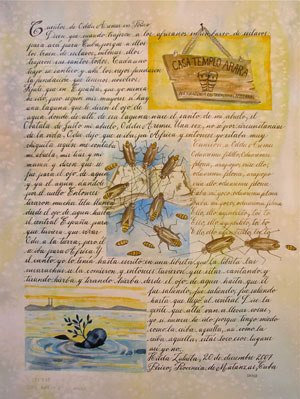The Cockroach Manuscript

Sumi Ink, metal leaf, and watercolor on paper, 17" X 22"
Hilda Zulueta, December 20, 2007, Perico, Cuba.
This manuscript contains an excerpt from an interview with Hilda Zulueta talking about the deity Oddu Aremu. She said she used to know a song for Oddu, but it was written in a notebook that had been eaten by cockroaches. We were able to find a song for Oddu Aremu elsewhere, and it appears on the right side of the manuscript in brown ink. The damaged notebook occupies the center of the manuscript in order to make the point that precious Arará religious traditions are quickly disappearing. (Perico is one of the few places in Cuba where Arará is still practiced.) Justo is pictured emerging from the lagoon with the herb given to him by Oddu Aremu. A plaque that hangs on the wall at Sociedad Africana today is shown in the upper right of the manuscript. It reads "Casa Templo Arará Para Mantener las Tradiciones Africanas". (House of the Temple of Arará for the Conservation of African Traditions.)
Hilda: dicen que en un barco cuando trajeron a los africanos de esclavos para acá para Cuba porque a ellos los traen de esclavos, entonces ellos trajeron sus santos todos.Si cada uno trajo su santico y ahí los viejos fundaron la fundación que tenemos nosotros. Fíjate que en España que yo nunca he ido, pero mis mayores si hay una laguna que le dicen el ojo de agua donde…de ahí de esa laguna nace el santo de mi abuelo, el Obatalá de Justo mi abuelo, Oddu Aremu.Una vez no sé por circunstancias de la vida, Odu dijo que se iba pa' Africa y entonces yo estaba muy chiquita según me contaba mi abuela, mis tías y mi mamá y dicen que se fue para el ojo de agua y ya el agua dándole aquí (por el cuello). Entonces tiraron mucha tela blanca desde el ojo de agua hasta el central España para que tuviera que virar Odu a la tierra, pero él se iba para Africa. Y el canto yo lo tenía hasta escrito en una libreta que la libreta las cucarachas se la comieron y entonces tuvieron que estar cantando y tirando hierba y tirando hierba desde el ojo de agua hasta que él fue saliendo, fue saliendo, fue saliendo hasta que llegó al central. Dice la gente que si allá van a llevar cosas, yo si nunca he ido porque tengo miedo como la ceiba aquella, así como la Ceiba aquella, estás loco esos lugares así yo no…
Cancion a Oddu Aremu:
Oddu Aremu filillo, Odduaremu felona, arapopo, erise ello, odduaremu felona, arapopo erise ello oduaremu felona. Baba mi yoco, oduaremu felona. Baba mi yoco, oduaremu felona. Ello, ello ayenbeleto, toi to, ello, ello ayenbeleto, toi to, ello, ello ayenbeleto, toi to.
Note: We were not given an exact translation for this song.
Hilda: They say that when they brought the Africans to Cuba in a slave ship, because they brought them as slaves, that is when they brought all of their saints. Each person brought their little saint, and that is how the elders created the foundation that we have now. Think about it, in España (the sugar refinery), although I have never been there, according to my elders, there is a lagoon that they call "el ojo de agua", where from there, from that lagoon my grandfather's saint appeared, the Obatala of Justo, my grandfathers Oddu Aremu. One time, I don't know due to what life circumstances, Oddu said he was going back to Africa. I was really small then, and according to what my grandmother, my aunts, and my mother told me, he (Justo) went to the "ojo de agua", and the water took him by the neck. Then they threw down a lot of white cloth from the lagoon to Central España (the refinery) so Oddu would turn around and return to land, but he was on his way to Africa. I had a song for it written in a notebook, but the cockroaches have eaten it. They had to sing and throw herbs, and throw herbs from the lagoon until he began to emerge. He was making his way, making his way, until he arrived at the refinery. People say they bring offerings there, but I have never gone, because I am afraid, just like I am afraid of that Ceiba tree, that Ceiba tree. Are you crazy? Go to those places?… not me.









